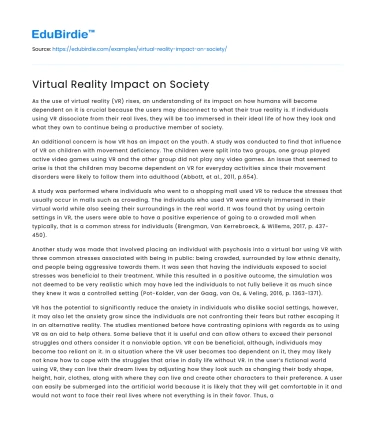As the use of virtual reality (VR) rises, an understanding of its impact on how humans will become dependent on it is crucial because the users may disconnect to what their true reality is. If individuals using VR dissociate from their real lives, they will be too immersed in their ideal life of how they look and what they own to continue being a productive member of society.
An additional concern is how VR has an impact on the youth. A study was conducted to find that influence of VR on children with movement deficiency. The children were split into two groups, one group played active video games using VR and the other group did not play any video games. An issue that seemed to arise is that the children may become dependent on VR for everyday activities since their movement disorders were likely to follow them into adulthood (Abbott, et al., 2011, p.654).
Save your time!
We can take care of your essay
- Proper editing and formatting
- Free revision, title page, and bibliography
- Flexible prices and money-back guarantee
A study was performed where individuals who went to a shopping mall used VR to reduce the stresses that usually occur in malls such as crowding. The individuals who used VR were entirely immersed in their virtual world while also seeing their surroundings in the real world. It was found that by using certain settings in VR, the users were able to have a positive experience of going to a crowded mall when typically, that is a common stress for individuals (Brengman, Van Kerrebroeck, & Willems, 2017, p. 437-450).
Another study was made that involved placing an individual with psychosis into a virtual bar using VR with three common stresses associated with being in public: being crowded, surrounded by low ethnic density, and people being aggressive towards them. It was seen that having the individuals exposed to social stresses was beneficial to their treatment. While this resulted in a positive outcome, the simulation was not deemed to be very realistic which may have led the individuals to not fully believe it as much since they knew it was a controlled setting (Pot-Kolder, van der Gaag, van Os, & Veling, 2016, p. 1363-1371).
VR has the potential to significantly reduce the anxiety in individuals who dislike social settings, however, it may also let the anxiety grow since the individuals are not confronting their fears but rather escaping it in an alternative reality. The studies mentioned before have contrasting opinions with regards as to using VR as an aid to help others. Some believe that it is useful and can allow others to exceed their personal struggles and others consider it a nonviable option. VR can be beneficial, although, individuals may become too reliant on it. In a situation where the VR user becomes too dependent on it, they may likely not know how to cope with the struggles that arise in daily life without VR. In the user’s fictional world using VR, they can live their dream lives by adjusting how they look such as changing their body shape, height, hair, clothes, along with where they can live and create other characters to their preference. A user can easily be submerged into the artificial world because it is likely that they will get comfortable in it and would not want to face their real lives where not everything is in their favor. Thus, a person living a fictional life will not be able to be a productive member of society. If the trend of the population using VR continues to increase, it can be detrimental to society as a whole if the negative of impacts of VR are occurring in masses.






 Stuck on your essay?
Stuck on your essay?

